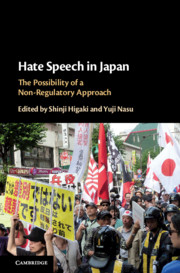Book contents
- Hate Speech in Japan
- Hate Speech in Japan
- Copyright page
- Contents
- Tables
- Figures
- Contributors
- Acknowledgements
- Abbreviations
- Introduction
- Part I Outline
- Part II History
- Part III Legal Framework
- Part IV Cases
- Part V Multidisciplinary Debates
- 15 Free Speech Jurisprudence in Japan
- 16 Japan’s Postcolonial Hate Speech
- 17 A Quantitative and Theoretical Investigation of Racism in Japan
- Part VI Current Issues
- Book part
- Index
16 - Japan’s Postcolonial Hate Speech
from Part V - Multidisciplinary Debates
Published online by Cambridge University Press: 15 January 2021
- Hate Speech in Japan
- Hate Speech in Japan
- Copyright page
- Contents
- Tables
- Figures
- Contributors
- Acknowledgements
- Abbreviations
- Introduction
- Part I Outline
- Part II History
- Part III Legal Framework
- Part IV Cases
- Part V Multidisciplinary Debates
- 15 Free Speech Jurisprudence in Japan
- 16 Japan’s Postcolonial Hate Speech
- 17 A Quantitative and Theoretical Investigation of Racism in Japan
- Part VI Current Issues
- Book part
- Index
Summary
Zainichi Koreans have been at the core of debates around hate speech in Japan. They may be the key to understanding the causal relations that produce hate speech. This chapter aims to clarify what is behind hate speech in Japan by examining why Zainichi Koreans are targeted by hate groups. It first focuses on the effect of Japan’s former colonial rule and the cold war on Koreans resident in Japan, and it finds two things: Japan enjoyed a prolonged postcolonial settlement, and the legal status of this group was determined by triadic relations. The chapter then considers the timing of the recent rise of hate groups, which has occurred long after open discrimination against Zainichi Koreans had diminished and their socioeconomic disadvantage had all but disappeared. Instead, it seems that hate speech has accompanied the proliferation of historical revisionism and worsening relations between Japan and neighbouring countries in the 2000s. Zainichi Koreans became the targets of hate speech because they were seen as belonging to a different regime. The chapter therefore concludes that Japan’s nativism and its accompanying hate speech should be understood as a variant of the historical revisionism that tries to justify Japan’s prewar imperialism.
- Type
- Chapter
- Information
- Hate Speech in JapanThe Possibility of a Non-Regulatory Approach, pp. 363 - 380Publisher: Cambridge University PressPrint publication year: 2021



